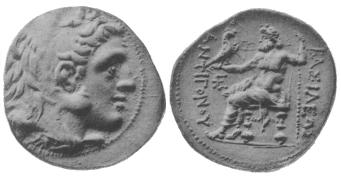Antigonus I, King of Macedonia, 382 B.C.-301 B.C.
Enlarge text Shrink textAntigonus I Monophthalmus (Ancient Greek: Ἀντίγονος Μονόφθαλμος Antigonos Monophthalmos, "Antigonus the One-Eyed"; 382 – 301 BC) was a Macedonian Greek general and successor of Alexander the Great. A prominent military leader in Alexander's army, he went on to control large parts of Alexander's former empire. He assumed the title of basileus (king) in 306 BC and reigned until his death. He was the founder of the Antigonid dynasty, which ruled over Macedonia until its conquest by the Roman Republic in 168 BC. Antigonus likely served under Philip II of Macedon. He took part in Alexander's invasion of Achaemenid Persia and was named satrap of Phrygia. After Alexander's death in 323 BC, he also received Pamphylia and Lycia in accordance with the Partition of Babylon. However, he later incurred the enmity of Perdiccas, the regent of Alexander's empire, and was driven from Phrygia. He fled to Greece and formed an alliance with Antipater, later joined by Ptolemy, against Perdiccas. Perdiccas was murdered by his own officers in 320 BC, and Antipater was elected the new regent. During a series of wars between Alexander's successors, Antigonus briefly emerged as the most powerful of the Diadochi, ruling over Greece, Asia Minor, Syria, Phoenicia and northern Mesopotamia. Cassander, Seleucus, Ptolemy and Lysimachus formed a coalition against him, which culminated in his decisive defeat and death at the Battle of Ipsus in 301 BC. His kingdom was divided up by Lysimachus and Seleucus, but his son Demetrius survived and went on to seize control of Macedonia in 294 BC.
Read more on Wikipedia >
 Personality
Personality



